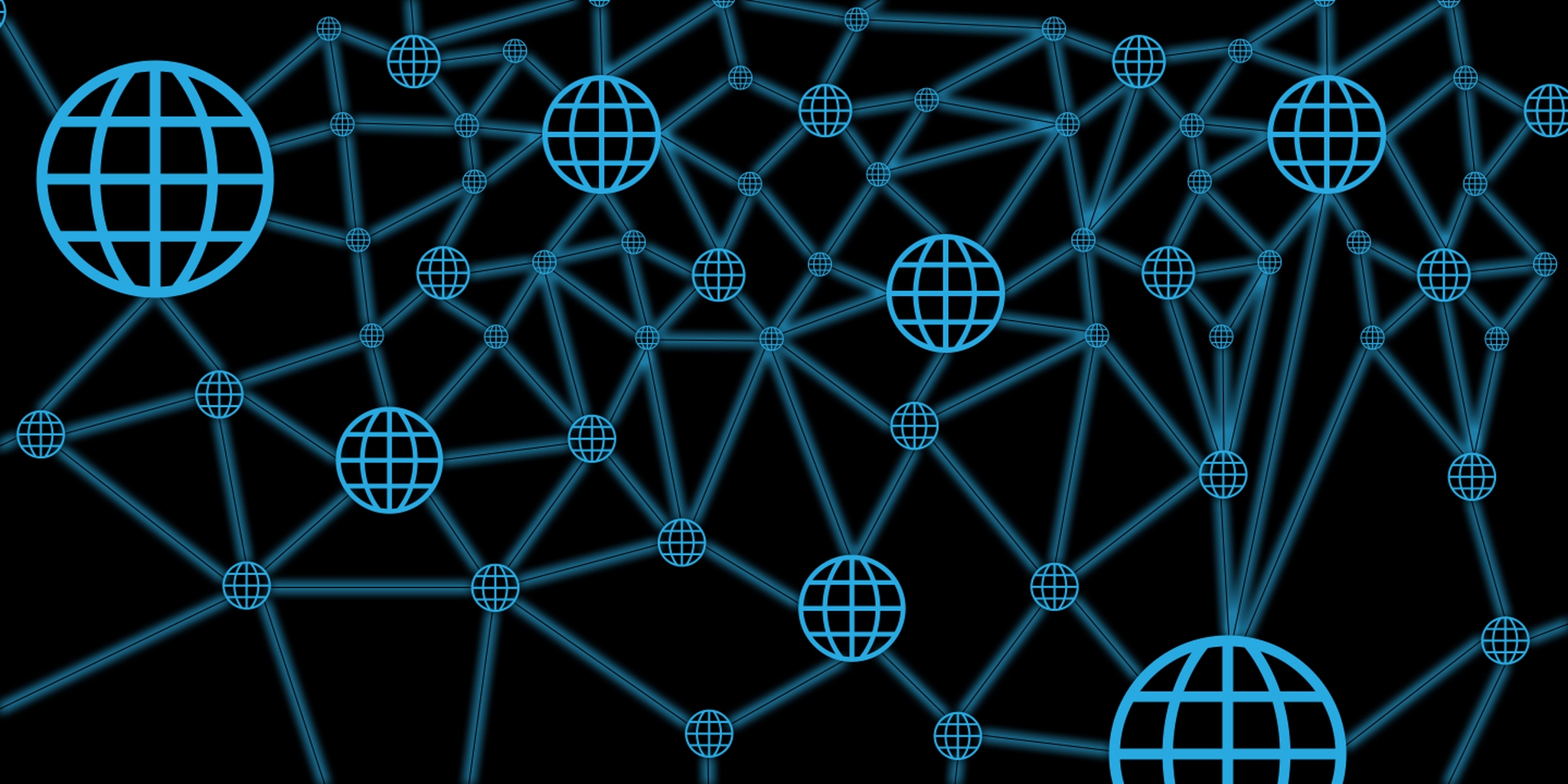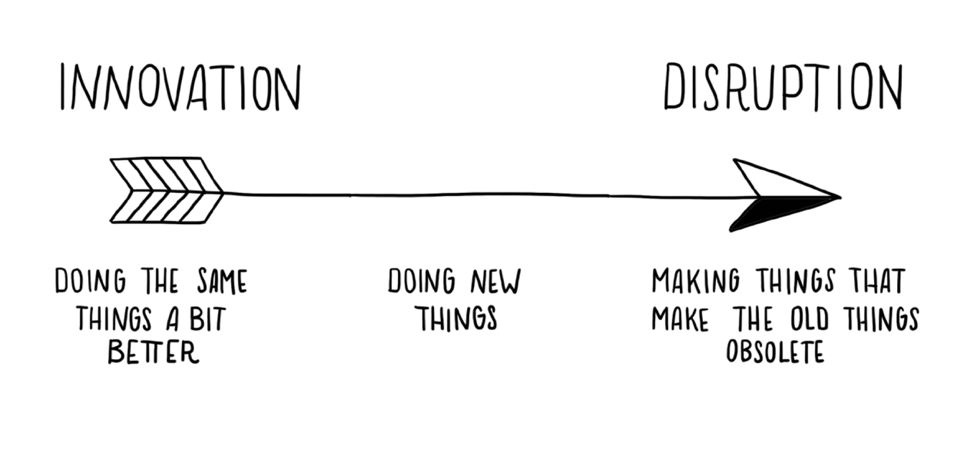Welcome to the Age of Decentralization, Part 1

Sometimes I think I know how Victorians must have felt, with all those newfangled contraptions and technologies coming out, making people's lives better and easier.
Just as people at the turn of the 20th century got to witness marvels of technology and industry never before imagined, we are now experiencing a similar revolution in the very way systems of human interaction are set up.
The decentralization trend is everywhere, having disrupted major industries such as publishing, vacation rentals, manufacturing, and, as Steemians well know, social media and money. I see it as a natural response to the bigness of things. We've got big banks, big corporations, big nanny states, big pharma, big agri, and a plethora of other institutions that are too big to fail, too big to change, and too big to fight on their own terms. These institutions have used their bigness in (often successful) attempts to consolidate control over society and economy. Smaller businesses have little hope of competing against the collusion tactics of major, entrenched corporations, and individuals have little hope of circumventing the all-powerful purview of the state. But competition can't be stopped for long. Decentralization is coming for all those institutions that have gotten too big for their britches.

These huge, centralized institutions are very good at fighting wars amongst themselves. They're very accomplished at squashing smaller opponents. But what they can't do is fight a thousand tiny battles at the same time, on different fronts. Here are a few more examples of what I'm talking about:
- Decentralized services like AirBnB and Couchsurfer have thrown the hotel industry for a loop and a half, allowing individuals looking for travel accommodations to connect with other individuals with extra space to rent, and leaving major vacation and resort concerns scrambling to fill their expensive rooms.
- The same thing is happening to the taxi industry, as commuters abandon taxis in favor of the superior and less costly ride options offered by Uber and Lyft, and drivers opt to drive for these services where they can be more in charge of their own careers, rather than paying hefty fees to taxi unions and having to deal with all the union regulations.
- As my friend @winstonalden discussed in his recent post, Want to be a Successful Author? Burn Any Rule Book You Find, the traditional publishing industry is reeling from the effort of fighting these constant battles with competitors too numerous to count. Millions of individual authors around the world are figuring out that they can have better chances of success, connect more easily with their audiences, and make more money by cutting out the middle man and self-publishing their books.
- As individuals around the world discover the freedom offered by cryptocurrencies, central banks and big financial institutions are waking up to the threat that crypto presents to their hold on the future of money.
- Folks are neglecting their Facebook and Twitter accounts in favor of posting on Steemit, where they have more control over the user experience, and can get paid for participating in social media.
- Although modern warfare has tools of death and destruction that were unimaginable a century ago, it seems unable to squash the threat of ten thousand tiny terrorist cells. Terrorism, too, is part of the decentralization trend. The United States military and its NATO allies have long been seen as too big and powerful to defeat, but Islamic terrorism is a hydra. Slice off one head, and three more grow back in its place.
- Even whole countries are getting in on the decentralization trend, as with Brexit in 2016 and a dozen other "exits" and secessions being seriously proposed around the world. The citizens of these nations are expressing discontent with top-heavy, centralized rule from afar, and are pushing for more local governance.

With the exception of Islamic terrorism, each one of these examples of the decentralization trend promises a bright future of greater freedom and prosperity for the human race. Just like those Victorians, we stand on the cusp of a better world, thanks to the technologies being developed and implemented today. Welcome to the Age of Decentralization.
At a time when everything from transportation to warfare is being decentralized, what changes can we expect in the near future? Tomorrow I'll post a list of predictions for the next ten to twenty years.

Read Part 2 of the Welcome to the Age of Decentralization series!

I love you, Steemit!
Hi, I'm Starr!

Hey Leslie, Sorry that I could not reply yesterday, but while enjoying a lovely end of the day walk on the beach with my wife, the clouds opened and tried to drown us while the internet gods shouted down… no connection for you! (one of the few disadvantages of living away from it all). Anyway, the rain has stopped, the sun is out, the humidity is rocketing up with ballistic force and I am back online. So, …..sometimes I feel like I am one of those Victorians that you spoke of. I am not quite at the point where I am doddering with my zimmer frame down to the local senior citizens coven for free cups of tea and home-made scones that are so dry that not even pot after pot of the tepid brew is enough to lubricate my degenerating oesophagus, but even so I can relate to the speed at which the world wizzes by. I can recall early in my career (just post the heyday of punk) lugging around a huge bag of 2 and 10 pence coins so that I could, at regular intervals, phone back to the office. These recurrent calls were not quite as onerous as you may imagine as back then there was a public phone box every few hundred yards (yes… we had yards back then). But there was a wonderful new dawn on the horizon. One day the producer that I was working for told me that I no longer needed to be crippled by my swag bag, as she pointed with pride to my desk, where I saw a large, fine leather case complete with a carry strap. I could hardly contain my excitement as I turned to her and said…..Fantastic…what the hell is it? ….It’s a Motorolla …..a motor who?... She explained that no longer did I need to run from my car through the pouring rain (I lived in Manchester, UK) to the phone box; I could sit in my warm, dry car and phone through updates. I was gob smacked…the future had arrived. Cut to the one week later with me standing on the roof of my car in the pouring rain as it was the only bloody place that I could get a half decent signal. I think what I am trying to say here is that, yes, we are definitely at a point in time when a technological and social seismic shift is about to take place, but as much as we may hope that it will be a beautiful fertile landscape, we need to acknowledge that we are bound to need shovel a bit of manure if it is ever going to be a bed of roses (though from the little I have read of your posts to date I imagine that you are of a similar opinion).
I could not agree more regarding the need for a more decentralised and equitable approach to how we structure our society. Indeed, my wife and I decided some seven years ago that the “bigness” of everything was all getting a bit too much so we took up an option that my wife had to island hop around the pacific for a while. So, to a certain extent we unplugged, and in doing so we found that we stepped into an inherently much more decentralised environment (though far from perfect, my wife works in the health sector of international aid). When I say a decentralised environment, I do not mean to suggest one that is free of the effects of governments or large institutions etc. but rather, a society that traditionally has a sharing mentality at its core. Currently we are living in Tonga, we have 3 banks (yes I mean banks but I also mean branches), there is no real multinational representation here other than the fact that we can buy coke and occasionally there are some meds available at the hospital. We have no Uber, if someone needs a ride, then they jump in the back of someone’s ute. Recently a few locals have slapped a taxi decal on the side of their car, but this is mostly for when a cruise ship is in and the pasty tourists, who melt in the heat, need to get to an aircon unit stat. We have a central market, but most people, if they are not eating what they produce, get their food from a neighbour who grows different produce and who has set up a table on the roadside at the front of their house. If someone has no money then they simply trade with what they have produced or with some other service or skill that they have. The idea of anyone going hungry in Tonga simply because they do not have any money is a completely alien concept.
I am not suggesting for one minute that Tonga or any of the Pacific Islands possess the tonic that will cure our “Western” ailments, far from it. I have faith in the blockchain and think that it highlights a potentially much more equitable future and that is shows great promise as a leveller and as a way to recalibrate how we live. But I do think that as much as we look to the future and value progress, that we would be wise to try and remember some of the things that we may have forgotten. Anyway, I ramble so I should move on. Thanks for the food for thought, my apologies for it being more of an emotional response that an intellectual examination. I will try and get back to the initial post that I started later (life chores and the internet gods allowing) I will also follow as I am sure that you have much more to say. Till we speak again take care, Cheers J
Thank you for sharing your thoughts, @jeffbowen.
I think that as these decentralization trends develop, you'll see more and more people reviving the better aspects of traditional ways of living. We are moving into an era where most people will work remotely, and not be tied down in cities. Internet access to rural areas is improving at a pretty impressive rate (although I can commiserate with you on the spottiness of that access--I live in the backwoods and have to rely on expensive satellite internet that hobbles my speeds after 10 gigs per month of usage.) Also, young people in developed nations are less interested than previous generations in settling down and getting a mortgage, while at the same time more interested in things like gardening, reusing, crafting, and self-sufficiency. Meanwhile, it is easier than ever to travel the world and connect with foreign places and cultures. I think it is all culminating toward a balance between the slow enjoyment of life/connection with community/nature that our ancestors experienced and the fast paced technologies that lengthen and improve our lives in the modern age.
I'm going to cover lifestyles more in depth in the third part of the series, but that's my feeling in a nutshell. Thanks for taking the time to write such a long and thoughtful comment. I've followed you, and am looking forward to reading more of your stuff.
The people are taking the power back. Centralized money has ruined many through inflation and so cryptocurrency has been born to fight back.
From my study of history, everything moves in a circle. I wonder what will happen when the wheel turns back towards centralization?
I think it's true that political and social trends are cyclical...but I'm not so sure about technological trends. For instance, once the printing press was invented, we never looked back. There may have been efforts here and there to stifle the written word, but overall printed information has only increased in amount and availability since that time, with new innovations helping the trend grow. Similarly, it is hard to imagine (barring some kind of apocalyptic scenario) that the human race will ever return to pre-Internet isolation and insularity, now that the technology exists to connect us across continents and oceans.
I think the decentralization trend is like that. It is underpinned with technologies that are too good to abandon. So in the realms of economy and money, I have my doubts that the trend will ever reverse. However, there is also a political component, which could end up being cyclical. Perhaps we will move more toward smaller and more local governance systems--like city states, and there will probably be a few experiments in stateless zones. But after some generations people might forget the point of all of that, and push for greater political centralization as a response to some threat to their security. That's entirely likely.
The big, centralised institutions can't fight back effectively because they're held back by their own bureaucracy. By the time they've figured out how to respond to a problem, the problem itself has changed and evolved so the solution becomes completely ineffective and archaic.
Hopefully the nature of decentralised institutions allows them to continue to grow without getting bogged down in the same way as the big guys!
Great post as always, looking forward to tomorrow's! x
I very good post, ma'am
The one thing I think worth pointing out though is that 'terrorism', as you illustrated it, is wrong (Imo).
The 'terrorists' are nothing more than a product of big government, of corporations, and centralization.
(from CIA funded mujahadeen, to isis)
I.e.- they are nothing to do with decentralization...They are, if anything, a tool used by the 'centralist' governments to sow chaos, in order to achieve further control.
....just sayin'....ma'am
I agree that the centralists fertilized the soil and sowed the seed of terrorism (and are continuing to do so). But I'm not so much saying that the terrorists themselves are part of decentralization--but that the warfare tactics are. Granted, the U.S. and other governments are using these threats to their advantage, but I think soon it will spiral out of their control, if it hasn't already.
Thank you for the comment, sir.
I respectfully disagree, ma'am.
(from a military history perspective - I know a little of).
Any fighting force needs money - and lots of it.
Washington's army in the war of independence is an exception. (but desertion was still crippling, due to lack of wages).
Lenin's revolution and ultimate success - was only made possible by being funded with gold from the western banks.
No money, no fighting force. It really is that simple.
If all government funding (from whatever side) stopped tomorrow. ...All the wars would be finished within 3 months.
I cannot think of a 'war' in the last 2000 years that wasn't funded by a rich donor - normally central governments, directly or indirectly.
'Fighting for principles' only come after a full stomach and bullets supplied for your gun..
When you have no rice to eat, you will fight for a bowl of it.
Someone is still providing the rice...
....so- that being the case (if I'm correct), that makes all the 'spiraling out of control', very much in their control - and just giving the appearance of something different...
...thanks for the reply, ma'am.
Okay, I haven't brought these things together with decentralization, but that's a nice point of view and I guess you are right. Waiting for more and followed! :-)
Isn't the gig economy great? I love the way it offers me complete control over my time and money. Any kind of expression of authority from anyone angers me, because I do not officially recognize anyone's authority over me except me and God. Any other kind of authority is a false construct other people have agreed to follow. I have agreed to no such thing.
Yes, you're right! It's such an amazing time to be alive. We have more freedom and control over our careers, money, and creative work than any generation before us. It's brilliant!